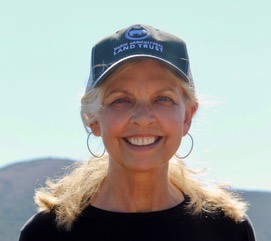
No Resting Place
Contributor’s Marginalia: Janet Jennings responding to Bruce Beasley’s “Will”
Bruce Beasley’s poem “Will,” like the ever-present sea in its lines, is in constant motion, mimetic of incoming and outgoing waves. The poem begins in opposition: Want; don’t. / Wouldn’t, did,… Verbs without a subject, though I infer an isolate speaker standing where land and sea meet, struggling with a tide of competing internal voices or drives or wills.
I love the vigorous sea-pound of the language and its heavy lean into the Anglo-Saxon roots of English with strongly accented single-syllable words, alliteration, and simile. There are wonderful invented compound words such as throughswell, swabscrub, and bruntslosh, which are so evocative of the ocean. Beasley also uses a semi-colon in the first line of each of the six stanzas, which functions like the mid-line caesura in Anglo-Saxon poetry.
The title, “Will,” is both forthright and complex. In the Merriam-Webster dictionary, there are seven definitions of “Will” as verb and six definitions of “Will” as noun. Among them, “Will” expresses futurity; or desire and willingness; or can be used as a command or exhortation.
As a noun, “Will” can mean determination, desire, power, control. If a noun, whose will does the title speak of? The speaker’s, humankind’s, God’s? Is it a clash of wills? The isolate vs. God? Is the speaker at a difficult point in his/her life, seeking shelter from the surging sea? Or does the speaker seek union with the sea?
A tidepool, tiny world within a world, appears in stanza two, agitated, hesitant, and self-protective. A pool separated from the sea. A metaphor for the speaker/isolate?
Human-made barriers are constructed to protect coastline from the hammer and erosion of the ocean. Structures such as jetty, breakwater, pilestone, and seawall groyne appear in the poem, but they are fissured, riven, broken. A metaphor for human will? Though made of stone or granite, they are permeable. I particularly love how these words jut out into the white space of the page as if out into the sea.
God enters the poem rather violently in stanza six with God-smite, which sounds very Old Testament. I confess to being troubled by the word “God” in these fraught times, when the word has been coopted for political ends. This poem may be one way to take the term and meaning back.
The stressed language, the spiritual struggle, and God blended with the power of nature, call to mind Gerard Manley Hopkins in poems such as “God’s Grandeur” (The world is charged with the grandeur of God) and “Carrion Comfort.” Here are the final lines from “Carrion Comfort,” one of Hopkins’ Dark Sonnets:
Me? or me that fought him? O which one? is it each one? That night, that year?
Of now done darkness I wretch lay wrestling with (my God!) my God.
Hopkins writes of the “dark night of the soul.” “WILL” takes place under the noon-sun. High noon, where nothing can hide.
I read this poem as spiritual yearning in a struggle with human will. The will that builds jetties and harbors tries to assert itself against the power of the sea. As in Hopkins, nature, in this case the ocean, is the language that God speaks.
I love the line Oppose our sopor in stanza six. Great sounds and Wake us up! it seems to say. The isolate has become a “we.”
The final stanza is marvelous to read out loud, full of sundering, re-fusing, and propulsion. That wonderful smash-merge, a fracturing and coming together at once, like atoms smashed to create nuclear fusion. An ecstatic state? Shelter combines with welter, haven combines with heave—seeming contradictions. No resting place in this poem, which becomes a prayer: Lord, shelter us. I puzzled long over the final heave. One can pull haven and heave out of the word “heaven,” though their etymologies are different. To heave is to raise or lift up, as if riding the crest of a wave. To the last syllable, we are immersed and in motion.
